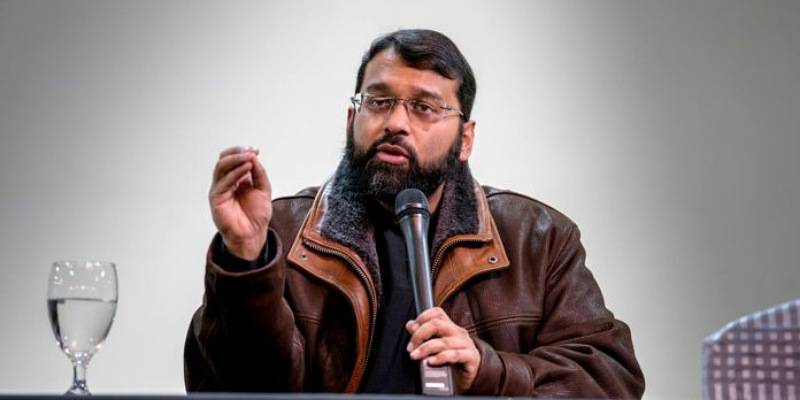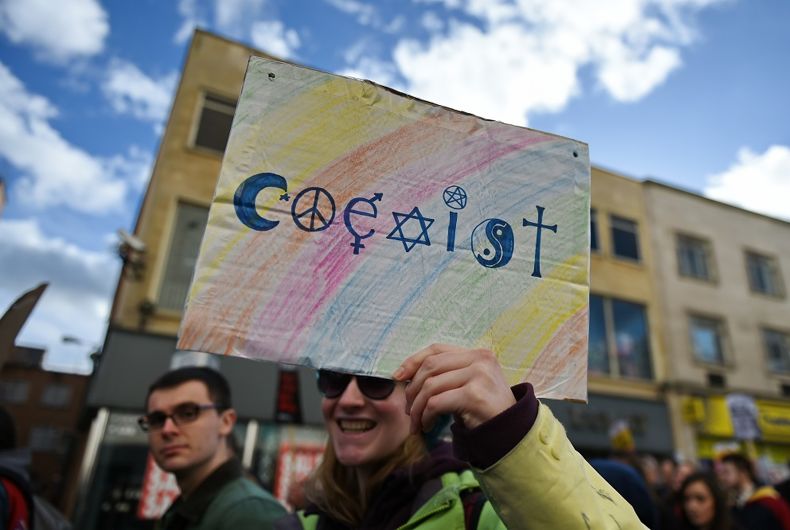
Recently news surfaced that Shaykh Yasir Qadhi has been cancelled for his disagreement with the “LGBTQ lifestyle.” The article evokes fear that preaching “mainstream Abrahamic morality … will get you blocked or fired from your job.” Qadhi feels that his paper had nothing to do with the LGBTQ issue and yet he was blocked by a European University from presenting his work. Additionally, he expresses concern that those “who claim to preach love and tolerance sometimes show the most blatant hatred and intolerance?” He also evoked horror that “why should I not be able to teach my children or preach to my congregation about our religious values?! There are dark times ahead.”
Such tactics to rile up one’s minions are not new. In 2013, Imam Omar Suleiman expressed:
“Days are very near that disagreeing with homosexuality will be just as bad as being a racist. ... If as Muslims we don't take a clear stance on this, we will be forced to conform and watch this disease destroy our children.”
Yet, the same Omar Suleiman steers away from making such strongly worded statements today and has even been called out by the more hardline American Muslim spokespersons for working with LGBTQ groups on civil rights issues. Returning to Qadhi, a whole circus started on social media on his FaceBook and Twitter accounts. Qadhi is a very influential person and enjoys the support of Muslims who rail against the western lifestyle. The fact that he can stir up a tempest on social media among his followers, rousing their fears and passions, is a testament to the power he wields on the Muslim masses. Others are not in such a position of power and privilege. Consider, for instance, the case of Dr. Hussein Abdullatif, who was asked to stop teaching Qur’an classes simply because he had co-authored the book, Islamic Law and Muslim Same-Sex Unions. Dr. Abdullatif does not have a platform or following like Qadhi to complain, protest or engage in theatrics.
Similarly, the septuagenarian Frank Parmir was asked to leave the Islamic Society of North America Convention in Chicago a few years ago for his pro LGBTQ advocacy with Muslims for Progressive Values. Many LGBTQ Muslims are in such positions. Some had to put their career on hold to engage in work that drains them of their well-being. They do not get paid for LGBTQ activism and are often juggling economic pressures of low paying jobs to lend out time to LGBTQ activism. This is in addition to family and community pressures stoked by the likes of Qadhi in the guise of “preaching Abrahamic morality”, and the lateral violence and objectification in gay subspaces.
Qadhi is not the only one to have experienced “cancel culture.” It is true that thinkers like Nadeem Farooq Paracha have correctly identified the self-defeating tactics in woke culture. In a Pakistani context, he expressed:
“Ammar Ali Jan, Taimur Rahman, Ammar Rashid, Arooj Aurangzeb, Jibran Nasir and some others who have refreshed and reconfigured the progressive narrative according to the current political, social and economic realities, and without falling victim to the reckless online woke-ism that has done more damage to various progressive causes than not.”
However, the term “cancel culture” is often used by the political right against what is perceived to be an encroachment on their “freedom of speech.” Consider, for instance, Jordan Peterson, who has been “cancelled” from speaking at various events for his opinions on issues pertaining to the transgender community. There are others, who face public scrutiny for denying the Holodomor, the Ukrainian genocide under Stalin. Then again concerns are raised against comedians who engage in rape jokes. All of this means that the term “cancel culture” is used by those who feel they should be allowed to express their opinions against vulnerable communities with impunity. Therefore, Qadhi is not being singled out as a Muslim, but he ends up falling in the same company as Jordan Peterson and others, who use their position and privilege to oppress vulnerable minorities and when called out, initiate social media storms that they have been victimized.
There are many Muslims across the globe who find no issues with LGBTQ communities. This is because public displays of affection between men, who hold hands or kiss both cheeks, is quite normal for them. Additionally, they grew up witnessing sexual minorities in South Asia and Southeast Asia quite openly to harbour any disgust that emerges in a North American context. Many young Muslims have LGBTQ friends, and some have LGBTQ siblings. They understand that Allah is much greater than the narrow “Abrahamic morality” that is being preached by Shaykhs who are more concerned about their egos and threats to their own privileged lives, than with the plight of human beings who just want to live this incredibly short and difficult life in peace.
In essence, this whole tempest in a teacup is not about Muslim values, Muslim parents, and their children. This is about Yasir Qadhi projecting himself as a martyr for the cause. But the truth is, he is just another one of these pop up Shaykhs who is protecting his market share in selling his wares in the Islamic market.
Such tactics to rile up one’s minions are not new. In 2013, Imam Omar Suleiman expressed:
“Days are very near that disagreeing with homosexuality will be just as bad as being a racist. ... If as Muslims we don't take a clear stance on this, we will be forced to conform and watch this disease destroy our children.”
Yet, the same Omar Suleiman steers away from making such strongly worded statements today and has even been called out by the more hardline American Muslim spokespersons for working with LGBTQ groups on civil rights issues. Returning to Qadhi, a whole circus started on social media on his FaceBook and Twitter accounts. Qadhi is a very influential person and enjoys the support of Muslims who rail against the western lifestyle. The fact that he can stir up a tempest on social media among his followers, rousing their fears and passions, is a testament to the power he wields on the Muslim masses. Others are not in such a position of power and privilege. Consider, for instance, the case of Dr. Hussein Abdullatif, who was asked to stop teaching Qur’an classes simply because he had co-authored the book, Islamic Law and Muslim Same-Sex Unions. Dr. Abdullatif does not have a platform or following like Qadhi to complain, protest or engage in theatrics.
Similarly, the septuagenarian Frank Parmir was asked to leave the Islamic Society of North America Convention in Chicago a few years ago for his pro LGBTQ advocacy with Muslims for Progressive Values. Many LGBTQ Muslims are in such positions. Some had to put their career on hold to engage in work that drains them of their well-being. They do not get paid for LGBTQ activism and are often juggling economic pressures of low paying jobs to lend out time to LGBTQ activism. This is in addition to family and community pressures stoked by the likes of Qadhi in the guise of “preaching Abrahamic morality”, and the lateral violence and objectification in gay subspaces.

Qadhi is not the only one to have experienced “cancel culture.” It is true that thinkers like Nadeem Farooq Paracha have correctly identified the self-defeating tactics in woke culture. In a Pakistani context, he expressed:
“Ammar Ali Jan, Taimur Rahman, Ammar Rashid, Arooj Aurangzeb, Jibran Nasir and some others who have refreshed and reconfigured the progressive narrative according to the current political, social and economic realities, and without falling victim to the reckless online woke-ism that has done more damage to various progressive causes than not.”
However, the term “cancel culture” is often used by the political right against what is perceived to be an encroachment on their “freedom of speech.” Consider, for instance, Jordan Peterson, who has been “cancelled” from speaking at various events for his opinions on issues pertaining to the transgender community. There are others, who face public scrutiny for denying the Holodomor, the Ukrainian genocide under Stalin. Then again concerns are raised against comedians who engage in rape jokes. All of this means that the term “cancel culture” is used by those who feel they should be allowed to express their opinions against vulnerable communities with impunity. Therefore, Qadhi is not being singled out as a Muslim, but he ends up falling in the same company as Jordan Peterson and others, who use their position and privilege to oppress vulnerable minorities and when called out, initiate social media storms that they have been victimized.
Qadhi is miffed at being cancelled and so takes it out on the LGBTQ community that while they “preach love and tolerance”, they are showing “blatant hatred and intolerance.” Qadhi wants to be free to preach that gay people engage in a major sin and that those who justify same-sex unions are guilty of apostasy. Of course, he selects his words carefully and will not preach the death punishment in western countries that do not abide by Islamic law. This to him is “Abrahamic morality.” But then, isn’t he aggrandizing his claim that Jews, Christians, and Muslims have the same opinion on same-sex unions? Does he forget his own lecture in Singapore from a few years ago, where he claimed something to the effect that most Jews and Christians in the U.S. now accept same-sex unions? Indeed, this insistence on “Abrahamic morality” is a common tactic used by those who feel cornered and must make their claim larger than it actually is.
There are many Muslims across the globe who find no issues with LGBTQ communities. This is because public displays of affection between men, who hold hands or kiss both cheeks, is quite normal for them. Additionally, they grew up witnessing sexual minorities in South Asia and Southeast Asia quite openly to harbour any disgust that emerges in a North American context. Many young Muslims have LGBTQ friends, and some have LGBTQ siblings. They understand that Allah is much greater than the narrow “Abrahamic morality” that is being preached by Shaykhs who are more concerned about their egos and threats to their own privileged lives, than with the plight of human beings who just want to live this incredibly short and difficult life in peace.
In essence, this whole tempest in a teacup is not about Muslim values, Muslim parents, and their children. This is about Yasir Qadhi projecting himself as a martyr for the cause. But the truth is, he is just another one of these pop up Shaykhs who is protecting his market share in selling his wares in the Islamic market.
